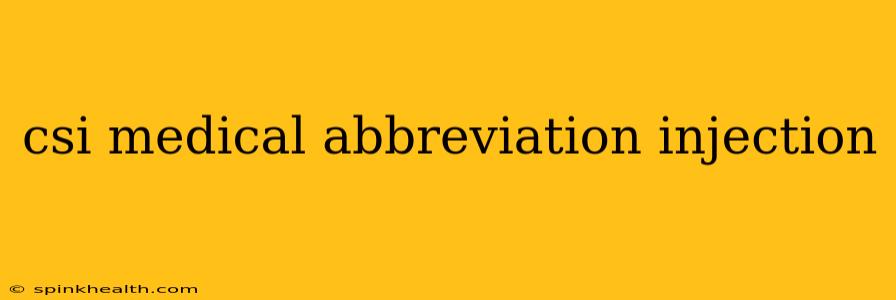Decoding CSI: The Medical Mystery of the Injection
The initials "CSI" might conjure images of crime scene investigators meticulously collecting evidence. But in the world of medicine, CSI takes on a completely different meaning—and it's far less dramatic, though equally important. In this case, CSI stands for Continuous Subcutaneous Infusion. This isn't a single injection, but a method of delivering medication slowly and continuously under the skin.
Let's delve into this fascinating medical technique and unravel the mysteries surrounding its use.
What is Continuous Subcutaneous Infusion (CSI)?
Imagine a tiny, painless pump diligently working away, slowly releasing medication directly beneath the skin. That's essentially what CSI is. This method contrasts sharply with traditional injections, which deliver a concentrated dose all at once. With CSI, the medication is delivered at a controlled and consistent rate, providing a steady supply over a longer period. This offers several advantages, depending on the medication being administered.
The pump used in CSI is usually small, about the size of a pager, and worn externally. It's attached to a catheter (a thin, flexible tube) that's placed just under the skin. This catheter delivers the medication from a reservoir, often a small bag or vial, held within the pump.
What types of medications are administered via CSI?
The choice of medication for CSI is dictated by the patient's condition and the medication's properties. Some common applications include:
-
Pain Management: CSI can deliver potent pain relievers directly into the bloodstream, providing consistent pain relief without the peaks and troughs associated with oral or intermittent injections. This is particularly useful for patients with chronic, severe pain.
-
Chemotherapy: In some cases, CSI is used to deliver chemotherapy drugs, allowing for continuous, controlled exposure to the cancer cells. This approach can minimize some of the harsh side effects often associated with traditional chemotherapy regimens.
-
Antibiotics: For severe infections that require prolonged antibiotic therapy, CSI can ensure consistent drug levels, maximizing effectiveness and minimizing the risk of relapse.
-
Other Medications: A variety of other medications can be administered via CSI, including those used to manage nausea, vomiting, and other symptoms associated with serious illness.
What are the advantages of CSI over other administration methods?
CSI offers several compelling advantages:
-
Consistent Medication Levels: This ensures a steady therapeutic effect, preventing fluctuations that can lead to ineffective treatment or increased side effects.
-
Reduced Frequency of Injections: Unlike traditional injections, CSI eliminates the need for frequent needle sticks, increasing patient comfort and reducing the risk of infection at injection sites.
-
Improved Patient Compliance: The continuous delivery aspect can improve patient adherence to medication regimens, especially for long-term treatments.
-
Minimized Side Effects: In some cases, CSI can reduce the intensity and frequency of side effects associated with certain medications.
How long does a CSI infusion typically last?
The duration of a CSI infusion varies considerably depending on the specific medication, dosage, and patient needs. Some infusions may last for several days, while others may be required for weeks or even months. The healthcare team carefully monitors the patient throughout the process, adjusting the infusion as necessary.
Are there any risks associated with CSI?
As with any medical procedure, CSI carries some potential risks. These include:
-
Infection at the catheter site: Strict aseptic techniques are crucial to minimize this risk.
-
Clot formation: Blood clots can sometimes form at the catheter site.
-
Irritation at the insertion site: This can be managed with appropriate skin care.
-
Medication incompatibility: The compatibility of the medication with the infusion system must be carefully evaluated.
CSI is a sophisticated medical technique offering significant advantages in specific clinical situations. While not suitable for all medications or patients, it represents a valuable tool in the physician's arsenal for delivering consistent and effective medication therapy. The potential benefits and associated risks must be carefully considered on a case-by-case basis.

